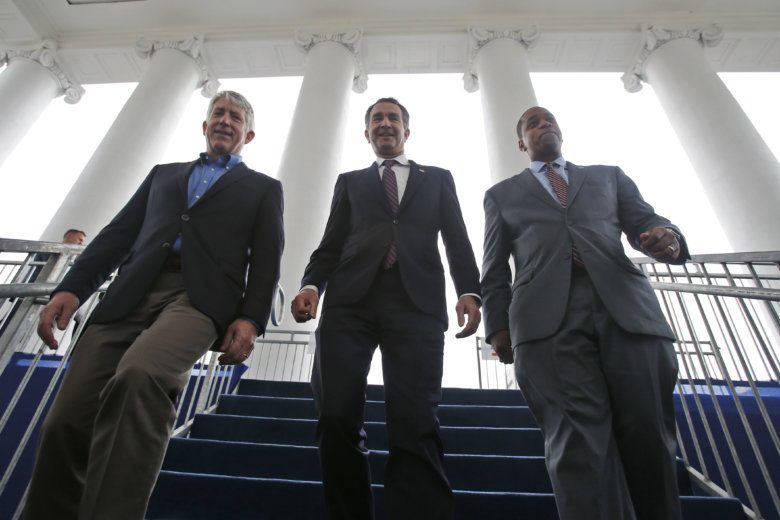
Editor’s note: As Virginia’s new General Assembly prepares to convene in the new year, WTOP News is spotlighting some of the issues legislators will consider. This installment covers potential criminal justice reforms.
Significant criminal justice reforms are possible as Democrats take control of Virginia’s General Assembly on Wednesday. These include changes to drug laws and parole, as well as an easier path to expunging criminal records.
Gov. Ralph Northam, also a Democrat, is supporting the decriminalization of simple marijuana possession, raising the dollar value threshold for felony larceny from $500 to $1,000, permanently ending the suspension of driver’s licenses for unpaid fines or fees, and allowing new consideration of parole for some prisoners.
MORE: What Virginians can expect from the General Assembly in 2020
- FAQs: What is happening with gun legislation in Virginia?
- Election controversies, other concerns prompt potential Virginia voting changes in 2020
- What Virginia lawmakers might change about your commute
- What’s in the Virginia budget plan
Criminal justice reform
Virginia no longer has parole for most prisoners, but a number of bills would wholly reinstate it, expand to groups such as those serving long sentences for crimes committed as juveniles, and call for a study to see if and how the state should make parole more accessible.
Several proposals would remove total bans on people with past felony drug convictions qualifying for Temporary Assistance for Needy Families.
Several proposals from lawmakers also aim to make it easier to continue life with a clean slate.
The expungement process could soon cover any charges that were dropped by prosecutors, misdemeanor convictions, nonviolent felony convictions if a person has been out of jail or off probation with no problems for several years, shoplifting charges for minors accused of stealing food or medical supplies or prostitution offenses if the person was forced, tricked or a victim of human trafficking.
There is also a proposal, backed by the governor, to allow anyone criminally convicted in the past to petition for either expungement or reclassification of their conviction if the action is now decriminalized, a change that would primarily apply if marijuana possession becomes a civil offense.
People who were convicted of more serious crimes but maintain their innocence could also have an easier path to freedom, under a bill that would allow individuals to petition the Court of Appeals if newly available forensic evidence, such as a DNA test, supports their appeal or the scientific evidence that was used at their trial is discredited.
Additional proposals would abolish the death penalty and prevent people with severe mental illness from being sentenced to death.
Other bills would raise the minimum age for a child to be charged as an adult for a felony from 14 to 16 years old, allow for deferred disposition in cases where a defendant has autism or an intellectual disability and bar courts from requiring bond for pretrial release.
Another proposal would allow juries to recommend leniency in sentencing, including suggesting some prison time be suspended or served as probation, or that there be community service or mental health or substance abuse treatment in place of jail time.
Prisoners could also be permitted to work off fines through community service while behind bars, rather than only through community service outside of jail.
There are some proposals that would toughen criminal penalties, including some bills proposed by Republican lawmakers that would set more mandatory minimum sentences; Gov. Northam has promised to reject those bills.
Other less significant, but notable criminal law proposals already introduced ahead of the session include a repeal of Virginia’s criminal ban on sex outside of marriage and a repeal of the state’s ban on profane cursing or swearing in public.
Both “fornication” and cursing or swearing are Class 4 misdemeanors, carrying a fine of up to $250.
Sex crimes
A number of other bills would toughen penalties and clarify laws on sexual abuse or prostitution involving children and toughen penalties for sexual battery by massage therapists, physical therapists or medical professionals, as well as expanding domestic violence definitions to cover people who dated in the past year.
Anyone convicted three times of sharing explicit photos of a person without their consent could be required to register as a sex offender.
Another bill would allow for a three-year period, starting in July, when people otherwise blocked from filing sexual abuse lawsuits due to the statute of limitations would be allowed to file those cases anyway.
Drones and “smart” technology
In this age of “smart” homes and other technology, Del. Kaye Kory of Fairfax County is proposing a bill that would allow judges that enter protective orders to ban not just contact with the person who sought the order, but also to ban the remote control of an appliance, utility or device in that person’s home.
The General Assembly will also consider allowing local governments to regulate drone use on local government property like parks.
Drugs and alcohol
There are several proposed bills to decriminalize marijuana possession, with various fines suggested, and differing standards of how much is legal to possess for personal use.
While decriminalization is the most likely outcome this year, there are also proposals to legalize, regulate and tax marijuana production and sales to people 21 and older.
Several proposals aim to further regulate hemp-related sales and advertising, including potential restrictions on signage, required labeling for hemp-based CBD oils and limitations on promotion of hemp products while wearing a lab coat suggesting medical expertise.
Protections proposed for people who use cannabidiol oil or THC-A oil include a guarantee that usage will not be held against them in child custody battles and permission for nursing homes to have the oils.
Separately, the General Assembly will also consider a bill that would ban the sale or distribution of flavored tobacco or vaping products.
There is also a proposal to add more information about naloxone, the opioid overdose reversal drug, to annual renewal paperwork for pharmacists.
There are also a series of changes proposed to alcohol laws and licensing rules, which could include selling alcohol at more local malls, ending a food-sales ratio requirement for alcohol licensing at restaurants, an allowance to have distilling equipment without a license as long as it is not being used and clarifications of the definition of a liquid when it comes to sugary alcohol production.
Another bill would legalize drunken driving — but only so long as you’re on your own property.
The biggest changes focus on equity
With a big election win in November and Gov. Northam promising major changes to focus on underserved communities after his blackface scandal last year, Democrats say the most significant criminal justice changes this session are focused on fairness and equity.
As one example, Arlington Del. Patrick Hope and Fairfax County Sen. Scott Surovell are proposing renaming the Virginia State Crime Commission, which is where Republicans sent gun bills to die last year, to the Virginia State Justice Commission.
The name change would come with additional responsibilities of considering collateral consequences of conviction as well as how to improve diversion, rehabilitation, re-entry, equity and fairness in the legal system.
There is also a separate proposal to have the commission study equity and fairness in the criminal justice system over the next year, with recommendations for changes by the 2021 session.
Other bills are still being introduced, and those that have already been introduced will likely be amended during the legislative process if they go on to become law.







